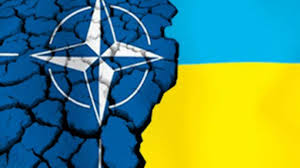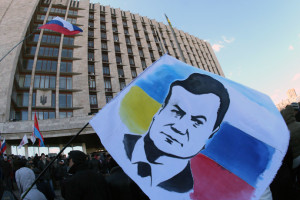Post-Maidan Ukrainian Anti-Semitism: Tragic “Blowback” Resulting from U.S. Interventionist Foreign Policy?

The foreign policy of the United States in the post-Cold War era, driven by a doctrine of Exceptionalism and managed by a neoconservative strategy, has been responsible for the invasion of Iraq in 2003, Nato’s war on Libya in 2011 and the covert war waged in Syria using Islamist proxies. It was also at the root of its involvement in the overthrow of the democratically elected government of Ukraine in 2014. But the geopolitical advantage intended in each enterprise has brought the proverbial blowback.
The results are plain to see. Libya is now certifiably a failed state. Accompanying the destruction of the country’s infrastructure during the war to overthrow Colonel Muammar Gaddafi was the loss of life which included the targeting by rebel factions of black African migrants and black Libyan citizens. The aftermath of Gaddafi’s fall, which is dominated by enduring battles between rival militias in different regions of the country has seen the rise of Islamist power including offshoots associated with the so-called Islamic State who have been responsible for the beheadings of Christian Ethiopian migrant workers. Migrants intending to reach European shores have lost their lives while embarking on perilous journeys across the Mediterranean Sea and there are even reports of West African migrants being bought and sold openly in modern-day slave markets.
Iraq is now a fractured state where many lives have been lost in a continuing cycle of violence. Added to the casualties of the battles during the invasion were those lost through a campaign to put down a Sunni insurgency which had been taking a toll on American soldiers. The war crimes associated with brutal battles in the city of Fallujah were repeated through a counterinsurgency strategy of U.S.-organised Shia death squads. Iraqi lives have continued to be lost in the ongoing war to liberate those parts of the country which were overrun by the Islamic State.
The Syrian War has cost approaching half a million lives and has led to the internal and external displacement of millions of its citizens. In both Syria and Iraq, Christians have faced violent persecution with those who fled from Iraq to Syria hoping for safety only to find their existence along with that of their Syrian coreligionists imperiled by the rise of jihadist groups.
Now in Ukraine where a war has raged between the Ukrainian army and the separatist armies of the eastern Donbass region, the country’s Jewish community is facing a rise in anti-Semitism due to a resurgent nationalism; a phenomenon which can arguably be directly attributed to the forces unleashed by the U.S.-sponsored coup d’etat of February 2014.
The narrative of the Western mainstream media in regard to the fall of the democratically elected government of Viktor Yanukovych still holds that it was as a result of a popular uprising of the masses symbolised by gatherings at Maidan Square in the city of Kiev. The truth is much different.
Serious questions need to be asked in several quarters about how the phenomenon of rising levels of anti-Semitism has been stimulated.
Firstly, what level of forethought was given by the responsible planning officials in the U.S. State Department, the Central Intelligence Agency and Nato intelligence as to the range of potential side-effects when making the decision to utilise the services of ultra-nationalist and neo-Nazi elements in the endeavour of so-called ‘regime change’?
Secondly, which agency within the government of Israel made the decision to send five Ukrainian Jewish emigres who were former Israeli Defence Force soldiers to lead a group of 40 street thugs in battles against the security forces of the Yanukovych-led government at Maidan? Did it have anything to do with a pledge made in the later part of 2013 by the head of the extremist Svoboda party to the Israeli ambassador that his party was no longer anti-Semitic? Similar assurances were given in February 2014 by the neo-Nazi Pravy Sektor group to the ambassador when its leader claimed that it had rejected xenophobia and anti-Semitism.
Thirdly, why were important figures in Ukraine’s Jewish community quick to dismiss Russian president Vladimir Putin’s condemnation of the role of anti-Semitic groups in the Maidan coup as a cynical ploy aimed at dividing Ukraine’s Jewish community? In March of 2014, 21 leaders of Ukraine’s Jewish community signed an open letter addressed to Putin criticising him while confidently insisting that even the most marginal of Ukrainian nationalist groups did not demonstrate anti-Semitism or other forms of xenophobia.
Part of the letter read:
“And we know that our very few nationalists are well-controlled by civil society and the new Ukrainian government -which is more than can be said for the Russian neo-Nazis, who are encouraged by your security services.”
Putin’s purported objectives were at the time claimed to have been unsuccessful and according to Timothy Snyder, an American academic, the Jews in Ukraine had become “Ukrainian Jews”.
It is of course possible that the authors of the letter felt compelled to write what they did because they calculated that refusal to do so might have prompted unwanted scrutiny of the loyalties of Ukrainian Jews and even reprisals. Nonetheless, it is clear that several of its contents were manifestly untrue given, for instance, the decision of the post-Yanukovych parliament to issue an edict abolishing a law which allowed the country’s regions to make Russian a second official language.
The Maidan coup was overseen by Victoria Nuland, then the U.S. Under-Secretary of state for European and Eurasian Affairs, who was captured handpicking the future government of Ukraine in a tape of an intercepted conversation she had with the American ambassador to Ukraine.

Source: The Unz Review
Nuland, herself Jewish, had been photographed with Oleh Tyahnybok the leader of Svoboda who in 2004 had spoken about the need to fight the “Muscovite-Jewish mafia” controlling Ukraine. The following year, Tyahnybok signed an open letter to then-President Viktor Yushchenko which called for the government to halt the “criminal activities” of “organised Jewry”.
In the coming years, the dismantling of the Yanukovych government will come to be seen less as a popular uprising than as a foreign-sponsored intelligence operation along the lines of Operation Ajax, the CIA’s overthrow of the democratically elected government of Mohamed Mossadegh in Iran in 1953.
The CIA had bribed key officials and public figures into denouncing the policies of Mossadegh. It also rented the services of mobs composed of Right-wing activists and members of the underworld to manoeuvre the protests into the direction of violence. In a similar vein, Pravy Sektor and other extremist paramilitary organisations played a key role in the violence in Maidan Square. These bodies are composed of the worshippers and political descendants of Stepan Bandera, a Ukrainian nationalist leader.
Bandera’s image was on prominent display at Maidan and in a sense he served as a kind of spiritus rector for the enterprise. Bandera was a Nazi collaborator who was instrumental in forming the Roland and Nachtigall Battalions, both of which supported the Wehrmacht during the Nazi invasion of the U.S.S.R. in 1941. The 14th Waffen Grenadier Division of the SS (Ist Galician), also composed of Ukrainian volunteers, would later materialise as a fighting force on the German eastern front.
Anti-Semitism is embedded in the history of Ukraine. Ukraine composed a large geographical segment of the Pale of Settlement where Jews were largely restricted at the time of the Russian empire. Babi Yar, the ravine site of an infamous massacre of almost 34,000 Jews in 1941 is situated in Kiev.
Prior to the emergence of modern Ukraine after the breakup of the Soviet Union in the 1990s, each of the two previous independent Ukrainian states to have emerged during the course of the 20th century which were headed by the nationalist figures Symon Petliura and Stepan Bandera were linked to the commission of anti-Jewish pogroms.
Tyahnybok’s “Muscovite-Jewish” reference reflects the prevailing view propagated by nationalists who blame the historic misfortunes of the Ukrainian people on Russia and the Jews. This interpretation of history holds that the great famine of the 1930s, known in Ukraine as the Holodomor, was instigated by the ethnic Russian and Jewish Bolshevik leadership in the Kremlin, with the Jewish Lazar Kaganovich playing a key role in the tragedy in which millions of Ukrainians starved to death.
So poisonous is the legacy of anti-semitism in Ukraine that Arseniy Yatsenyuk, the lawyer and economist who became the first prime minister of Ukraine after overthrow of the Yanukovych government, denied being Jewish in the face of contrary evidence. It is a stance which prompted the followers of the Lubavitcher Rebbe to publish a lengthy open letter condemning Yatsenyuk for denying his Jewishness. In the same vein, nationalists frequently cast aspersions on the Ukrainian heritage of President Petro Poroshenko and opposition politician Yulia Tymoshenko by referring to the supposedly Jewish surnames that feature among the antecedents of both.
The ascendance of several Jewish figures such as Yatsenyuk to political power including the installation soon after the Maidan coup of the Jewish oligarch Ihor Kolomoysky as governor of Dnipropetrovsk, a part of the eastern region, is taken by ultra-nationalists as confirmation of a disproportionate level of Jewish power and influence in Ukraine.
The country is mired in an endemic culture of corruption and a patriarchal system which is proving difficult to reform. Poroshenko’s initiative to enable foreigners to be appointed to top positions in government through a special law which fast-tracked those earmarked via a presidential decree was seen as evidence of Ukraine’s dire economic circumstances. It also did not meet with the approval of Ukrainian nationalists many of whom voiced concerns about the implication that Ukrainians lacked the talent and expertise to transform their own fortunes as a nation.
Economic stagnation, if not regression, along with an intermittent but vicious civil war with Russian-speaking separatists in the eastern Donbass region render Ukraine as species of a failed state. And it is in circumstances of economic difficulties that anti-Semitism has often reared its head.
There have been recent publicised instances of Ukrainian public figures making blatantly anti-Jewish remarks. For instance, in March Nadiya Savchenko, the Ukrainian army pilot turned politician, claimed that while she did not consider herself anti-semitic, she did not like Jews because although constituting “two per cent” of the population, they “occupy 80 per cent of power.”
In May, Vasily Vovk, a retired general with connections to the country’s security service, called for the destruction of the Jewish community. Vovk asserted that he was “completely against Jews” and that they were not Ukrainians.
“I will destroy you along with Rabinovich. I’m telling you one more time – go to hell, zhidi (kikes), the Ukrainian people have it here with you”.
“Rabinovich” is believed to refer to Jewish Ukrainian oligarch and politician, Vadim Rabinovich.
The Simon Wiesenthal Center, a global organisation which monitors anti-Semitism, has highlighted concerns expressed by the Jewish community of a rise in bigotry and violence. If Ukraine is drifting slowly but inexorably into a new dark era of naked anti-Semitism, it is clear that the United States which backed the xenophobic Banderovsti at Maidan must reflect on the costs of its actions one of which has been the increase in Jewish insecurity and even flight from the country.
this article was first published on adeyinkamakinde.blogspot.co.uk
Adeyinka Makinde is a London-based writer. He can be followed on Twitter @AdeyinkaMakinde


